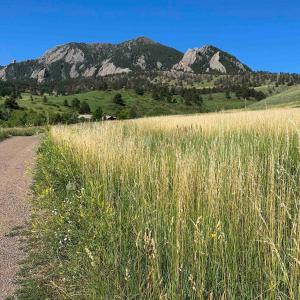2024 Rapid Climate Assessments
Date
It’s summer at CU Boulder, and that means it's time for the next slate of NC CASC Rapid Climate Assessment Program (RCAP) projects to begin! The RCAP is designed to develop a series of short, well-defined Rapid Climate Assessments (RCAs) to provide timely data, quick identification of vulnerabilities and risks, and provide crucial information for implementing strategies and making informed decisions. Teams of NC CASC researchers from CU, our Consortium Partners, USGS, and other partner organizations work with CU Graduate Research Assistants (GRAs) to synthesize scientific information that will serve as foundations for further research and stakeholder engagement. RCAP teams incorporate essential elements of collaborative climate adaptation science, such as co-production by stakeholders and researchers, status and vulnerability assessments, and the identification of challenges and solutions for the specific topic. These RCAs contribute to the body of scientific knowledge, providing data that can be used for ongoing climate research, monitoring trends, and improving predictive models. Last year, during the inaugural RCAP, topics spanned from climate change impacts and adaptations on prairie and mountain ecosystems to social science research on resource management and development of tools for conservation. You can view the slides and handouts generated from the 2023 RCAP GRAs here.
This year’s cohort of GRAs in the RCAP just started on their projects, which span the range of ecological transformations to Tribal planning processes to distilling key messages from the National Climate Assessment. A project led by NC CASC’s Drs. Imtiaz Rangwala, Kyra Clark-Wolf and Christy Miller Hesed, with GRAs Katie Bardsley and Lauren Lee Barrett, aims to compile and analyze the existing literature on the current state of scientific knowledge, research gaps, emerging socio-ecological issues, and management challenges within the sagebrush ecosystems of Wyoming, Colorado, and Montana. GRA Andrew Veselka will collaborate with an interdisciplinary team of scientists from NC CASC and the Bureau of Land Management (BLM), including Kyra Clark-Wolf, Imtiaz Rangwala, David Wood, and Jesse Hankins to perform a high-level climate impact synthesis for the Upper Missouri River Breaks National Monument (UMRBNM) in north-central Montana. This includes synthesizing current models and research on the terrestrial and aquatic ecosystems, wildlife habitats, and other resources of UMRBNM.
In a project titled "Biodiversity and Climate Change: A Regional Assessment of Scientific Knowledge and Policy Options," GRA Anna LoPresti will synthesize understanding of how climate change impacts species distributions and how climate-driven range shifts affect people through ecosystem services. This initiative supports a larger USGS effort to identify critical knowledge gaps and summarize implications for biodiversity and climate-change policy. It will be a first-of-its-kind assessment to characterize the state of understanding about the linkages between climate change and biodiversity in the US, Canada, and Mexico.
GRA Shelby Ross will collaborate with an interdisciplinary team (Janna Black and Kynser Wahwahsuck, BIA Tribal Resilience Liaisons; Heather Yocum, NC CASC) to gather publicly available planning documents from Tribal Nations, identify the timelines of these planning efforts (e.g., if plans are outdated and when they will be updated), and describe gaps or areas for improvement in plan updates or new planning efforts. The results of this research will directly contribute to ongoing efforts of the NC CASC to support Tribal Nations and communities in adapting to climate change.
A project on the synthesis of wildlife disease management under a changing climate includes GRA Kyle Schutz, who will work directly with Dr. Wynne Moss (U.S. Geological Survey and NC CASC affiliate) and Kimberly Szcodronski (Montana Fish, Wildlife & Parks). This work is part of a larger USGS-funded effort to understand the effects of climate change on wildlife disease. The results of this synthesis will be integrated into Montana’s 2025 State Wildlife Action Plan, which will guide the state's wildlife conservation efforts over the next decade.
Finally, a project with NC CASC program assistant, Hailey Robe, and NC CASC team members, Jane Wolken, Imtiaz Rangwala, Ulyana Horodyskyj Peña and Corrie Knapp (NCA5 Chapter 25 Lead Author, University of Wyoming) will synthesize and translate the relevant 'Key Messages' from the recently released National Climate Assessment (NCA5) for practitioners in the North Central region. Given that the NC CASC footprint spans multiple NCA5 region boundaries, ecosystems, and national topics, this synthesis and translation effort will evaluate and integrate content from several NCA5 chapters, including: Water (Ch 4); Forests (Ch 7); Ecosystems (Ch 8); Agriculture (Ch 11); Indigenous Peoples (Ch 16); Northern Great Plains (Ch 25); Southern Great Plains (Ch 26); and Southwest (Ch 28).
We look forward to seeing how these RCAs unfold over the next few months!


